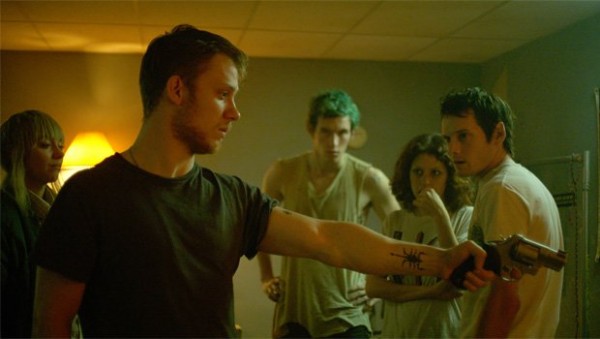
Courtesy of A Broad, Green Pictures
The Toronto International Film Festival’s Midnight Madness programme kicks off with rockers vs white supremacists drama, Green Room.
Let’s bitch it out…
One of last year’s best dramas, gritty revenge flick Blue Ruin, was an unexpected delight in part because director Jeremy Saulnier took a relatively threadbare premise and turned it into something fresh, vibrant and extremely well executed. Green Room is just as technically proficient – it has a great grim feel to it and the action is just as brisk and visceral – but this new film lacks the intimacy that made Saulnier’s breakthrough so memorable. If nothing else, Green Room feels a little too familiar, especially if you’re a genre fan who is used to seeing characters die in brutal fashion.
The film trades in familiar exposition, as well as genre tropes. A van of down on their luck rock musicians, the Ain’t Rights, seemingly catch a break when they book the opening act at a roadhouse in the middle of nowhere. They’re aware that their audience falls closer to the neo-nazi end of the spectrum, but they’re financially hard up and even manage to take the piss out of the audience with their opening cover of Dead Kennedy’s ‘Nazi Punks Fuck Off’. The show goes off without a hitch, they nab their $350 and are on their way out when a last minute visit to the titular green room to grab a forgotten cell phone exposes a homicide. From that point on the band is held prisoner in the waiting room, forced to fend for their lives over the course of a very long, bloody night.
That last point is part of the reason that the film doesn’t quite work. In Blue Ruin, there was only one lead character (Saulnier-regular Macon Blair, who shows up here as the club manager) and the film unfolded over several days. By expanding the core cast to four band members – Pat (Anton Yelchin), Sam (Alia Shawkat), Reese (Joe Cole), Tiger (Callum Turner) – plus witness Amber (Imogen Poots) and trying to pack the action into one intense night, none of the characters are developed or have a chance to grow. It’s long been a challenge for horror films that adopt this narrative structure; often character backstories are front-loaded in the early part of the film to try and generate audience goodwill when they are inevitably cut down later on (in this case by machetes, knives, shotguns and, in two occasions, pitbulls). Unfortunately despite Saulnier and his casts’ best efforts, the characters remain relatively 1-dimensional.
The same issues plague the antagonists, lead by clubowner Darcy (Patrick Stewart – underselling the menace to good effect) and his gang of red-laced goons. Their motivations are paper-thin – keep the band occupied until they can be disposed of in a easy-to-explain fashion. The suggestion of a white supremacist movement and an illegal drug operation are introduced but ultimately fail to develop into anything substantial. Add to this some issues with pacing and you have a final act that not only feels mildly anticlimatic but also drags a bit.
At its core, Green Room is a well-crafted thriller that sporadically leans heavily on the same unexpected and visceral bloodshed that Saulnier has brought to his previous films. The dry humour, especially Poots and Yelchin’s deadpan delivery under the more dire of circumstances, brings a nice levity that cuts through the tension to surprisingly humourous results. For fans of the horror genre, this is a solid, well-constructed entry that delivers the goods. For fans of Saulnier hoping for him to build and expand on the potential exhibited in Blue Ruin, this is probably a bit too threadbare and workman-like to fully satisfy. It’s not a bad film, but it could have been better.
Green Room continues to play at various film festivals, including Quebec City, Vancouver and London, UK over the next month.